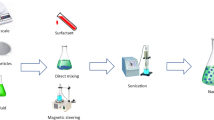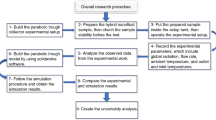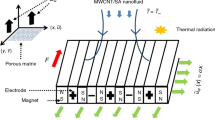Abstract
The preparation and utilization of hybrid nanofluids in thermal systems have become popular nowadays owing to their improved thermophysical properties. Although a nanofluid suspension increases the performance of the thermal system, hybrid nanofluids improve the heat transfer performance more by removing the disadvantages of each component. The aqueous hybrid nanofluids consisting of AlN and ZnO nanoparticles were prepared under various mixing rates and tested in a wickless, thermosiphon-type heat pipe under various circumstances. The effects of both unary and hybrid utilization of nanoparticles in the nanofluid preparation process were taken into consideration. The hybrid nanofluids were prepared in the mixing ratios of 25:75, 50:50, and 75:25 for AlN and ZnO nanoparticles, respectively. The experiments were run by applying 3 different heating powers to the evaporator section, and three different cooling tap water mass flow rates to the condenser section. Temperature distributions on all heat pipe sections were monitored, efficiency and thermal resistance values for each unary and hybrid nanofluids were specified. The results showed that hybrid utilization of nanoparticles enhanced heat pipe characteristics more compared to its unary counterparts. The maximum decrement of 40.79 % was obtained in thermal resistance of the heat pipe under 150 W, 6 g·s−1 conditions.











Similar content being viewed by others
Abbreviations
- con :
-
Condenser
- evp :
-
Evaporator
- i :
-
inlet
- ṁ :
-
Mass flow rate (g·s−1)
- o :
-
outlet
- tw :
-
Tap water
- R :
-
Thermal resistance (K·W−1)
- \(\dot{Q}\) :
-
Heat transfer rate (W)
- T :
-
Temperature (°C)
- ∆T :
-
Temperature difference (°C)
- η :
-
Efficiency
- CNT:
-
Carbon nanotube
- MWCNT:
-
Multi-walled carbon nanotube
- SEM:
-
Scanning electron microscopy
References
M. Bahiraei, A. Monavari, Appl. Therm. Eng. 179, 115621 (2020)
Z. Said, S.M.A. Rahman, M.E. Assad, A.H. Alami, Sustain. Energy Technol. 31, 306 (2019)
Y.L. Cui, W. Wang, B.X. Li, D.H. Zuo, Int. J. Heat Mass Transfer 159, 120084 (2020)
A. Khanlari, A. Sözen, H.İ Variyenli, M. Gürü, Heat Transf. Res. 50, 435 (2018)
T.P. Otanicar, P.E. Phelan, R.S. Prasher, G. Rosengarten, R.A. Taylor, J. Renew. Sustain. Energy 2, 033102 (2010)
M. Tahari, A. Ghorbanian, M. Hatami, D. Jing, Eur. Phys. J. Plus 132, 549 (2017)
K.X. Wang, Y. He, P.Y. Liu, A.K. Kan, Z.H. Zheng, L.L. Wang, H.Q. Xie, W. Yu, Renew. Energy 159, 652 (2020)
İ Aytaç, A. Sözen, Journal of Polytechnic-Politeknik Dergisi (2020). https://doi.org/10.2339/politeknik.703083
A. Sözen, A. Öztürk, M. Özalp, E. Çiftçi, Int. J. Environ. Sci. Technol. 16, 5095 (2019)
H.M. Ali, Hybrid Nanofluids for Convection Heat Transfer (Elsevier, New York, 2020), pp. 18–20. https://doi.org/10.1016/C2018-0-04602-2
K. Martin, A. Sözen, E. Çiftçi, H.M. Ali, Int. J. Thermophys. 41, 135 (2020)
M.F. Nabil, W.H. Azmi, K.A. Hamid, R. Mamat, Int. J. Heat Mass Transfer 124, 1361 (2018)
A.A. Hussien, N.M. Yusop, M.A. Al-Nimr, M.Z. Abdullah, A.A. Janvekar, M.H. Elnaggar, Iran J. Sci. Technol. Trans. A Sci. 43, 1989 (2019)
D. Huang, Z. Wu, B. Sunden, Exp. Therm. Fluid Sci. 72, 190 (2016)
M. Nuim Labib, M.J. Nine, H. Afrianto, H. Chung, H. Jeong, Int. J. Therm. Sci. 71, 163 (2013)
A.A. Minea, Int. J. Heat Mass Transfer 104, 852 (2017)
E. Bellos, C. Tzivanidis, Sustain. Energy Technol. 26, 105 (2018)
T.T. Hao, H.B. Ma, X.H. Ma, J Heat Trans-T ASME 141, 071802 (2019)
Y.Y. Xu, Y.Q. Xue, H. Qi, W.H. Cai, Int. J. Heat Mass Transfer 157, 119727 (2020). https://doi.org/10.1016/j.ijheatmasstransfer.2020.119727
M. Zufar, P. Gunnasegaran, H.M. Kumar, K.C. Ng, Int. J. Heat Mass Transfer 146, 118887 (2020)
R.K. Bumataria, N.K. Chavda, H. Panchal, Heliyon 5, e01627 (2019)
R. Ramachandran, K. Ganesan, M.R. Rajkumar, L.G. Asirvatham, S. Wongwises, Int. Commun. Heat Mass. 76, 294 (2016)
M.R. Tanshen, S. Lee, J. Kim, D. Kang, J. Noh, H. Chung, H. Jeong, D. Huh, J. Cent, South Univ. 21, 2341 (2014)
J.P. Holman, Experimental Methods for Engineers, 7th edn. (McGraw-Hill Book Co., New York, NY, 2001).
A. Sözen, A. Khanları, E. Çiftçi, Proc. Inst. Mech. Eng. Part A 233, 626 (2019)
A. Sözen, M. Gürü, T. Menlik, U. Karakaya, E. Çiftçi, Exp. Heat Transfer 31, 450 (2018)
Author information
Authors and Affiliations
Corresponding author
Ethics declarations
Conflict of interest
The authors declare that they have no conflict of interest.
Rights and permissions
About this article
Cite this article
Çiftçi, E. Distilled Water-Based AlN + ZnO Binary Hybrid Nanofluid Utilization in a Heat Pipe and Investigation of Its Effects on Performance. Int J Thermophys 42, 38 (2021). https://doi.org/10.1007/s10765-021-02792-2
Received:
Accepted:
Published:
DOI: https://doi.org/10.1007/s10765-021-02792-2




